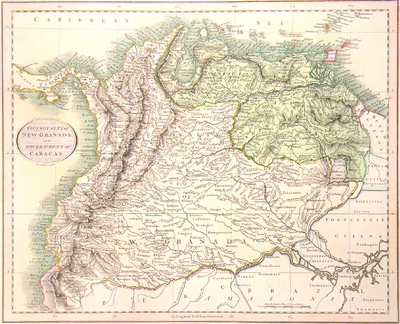
New Granada is a nation in the northern part of South America, formerly the Spanish Viceroyalty of New Granada. Its capital and largest city is Bogotá, and major ports include Santa Marta, Cartagena, Caracas, and La Guaira. The country has been ruled by Victoriano Hermión and his descendants since 1890.
Following the Trans-Oceanic War, New Granada gained its independence from Spain at the same time as Mexico and Guatemala. Throughout the 19th century, New Granada and Guatemala fought several wars for possession of the Isthmus of Panama, a fact that convinced businessman Bernard Kramer not to attempt to build a canal in Panama.
Mexican occupation of Guatemala in the Isthmian War of 1886 prompted a protest from New Granadan Premier Adolfo Camacho. Mexican Chief of State Benito Hermión responded by claiming that documents had been found in Guatemala City linking Camacho and deposed Guatemalan President Vicente Martinez to a French plot to attack the U.S.M. On 17 March 1887 Hermión produced documents that he claimed proved that Camacho and Martinez were planning an alliance or union directed against the U.S.M. Two months later, he produced more documents showing that New Granada, Guatemala and France were plotting to attack Mexico. French Premier Pierre Fornay claimed the documents were forgeries, and they were later proven to be so.
From 1887 to 1889, tens of thousands of Frenchmen suffering persecution in the U.S.M. fled to New Granada, while Hermión continued to denounce Camacho and his cabinet as "the devils of Bogotá." On 10 February 1890 Hermión addressed the Mexican Senate, claiming to have learned of a plot "hatched in Bogotá to assassinate leading members of this body, the Cabinet, and the Chief of State." Four days later, shots were fired at the homes of five senators, and bombs were found in the Presidential Palace. Hermión ordered the Mexican Fourth Army, stationed in Guatemala, to a state of readiness, and alerted elements of the U.S.M.'s Gulf and Pacific fleets to prepare for action.
Premier Camacho called the ambassadors of Great Britain, the C.N.A., and Spain to his offices on 15 February and told them of events in Mexico, saying, "We will fight the Mexicans if it comes to that, but in our struggle we may need help. What will your countries do in this time of trouble?" He warned C.N.A. Ambassador Wesley Eagen that "today Hermión threatens La Guaira, tomorrow he may attack Norfolk. You must realize that we will fight, and may be able to defeat this madman without your help. But if we fail, you will be next. Guatemala was the doorway to Bogotá, and Bogotá may prove the gateway to Burgoyne." However, Governor-General Ezra Gallivan was unwilling to intervene militarily on New Granada's behalf, and the British and Spanish refused to act without him.
Camacho chose to strike first, and the War for Salvation began on 1 March 1890 when the New Granadan army under General Roberto Bermúdez invaded Guatemala, advancing to the Kinkaid Canal. The next day, the Mexican First Fleet under Admiral Frank Butland took La Guaira, followed by Caracas on 3 March. Further west on the Gulf coast, the Mexican Third Fleet under Admiral Howard Loyo captured Santa Marta on 4 March, and the 34th Marine Brigade under Colonel David Brewster began advancing on Bogotá, reaching the capital on 8 June. Camacho was captured on 18 September, and Bermúdez surrendered to General Miguel Aguilar on 21 September.
Benito Hermión installed his older brother Victoriano Hermión as President of New Granada. Three years after the Mexican conquest, large deposits of iron ore and coal were found in the country. Following Benito Hermión's ouster in October 1901, his brother was allowed to remain President of New Granada until his death in 1906.
When Emiliano Calles announced his plan on 22 March 1922 to hold statehood plebiscites in Mexico's overseas dependencies, President Carl Hermión of New Granada rejected the proposal.
Sobel's sources for the history of New Granada are John Earley's A History of the New Granada Expedition (New York, 1914), Miguel Olin's El Jefe's War for Salvation (New York, 1956), and Willkie Devlin's The Other Hermión: The New Granadan Experiment (Mexico City, 1970).
In For All Nails, the Hermión family is overthrown in 1973 and a monarchy established in New Granada. The country is invaded by an alliance of European and Pacific nations in 1975.